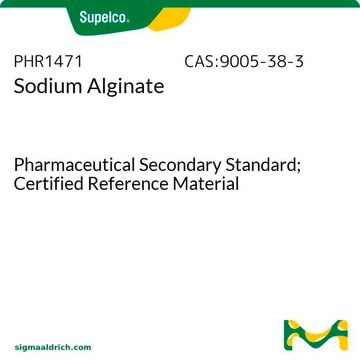A1112
Alginic acid sodium salt from brown algae
low viscosity
Synonym(s):
Algin, Sodium alginate
About This Item
Recommended Products
biological source
algae (brown)
Quality Level
form
powder
color
white to brown
viscosity
4-12 cP, 1 % in H2O(25 °C)
solubility
water: 10 mg/mL, cloudy to hazy, faintly yellow
storage temp.
2-8°C
InChI
1S/C6H10O7.Na/c7-1-2(8)4(5(10)11)13-6(12)3(1)9;/h1-4,6-9,12H,(H,10,11);/q;+1/p-1/t1-,2-,3-,4?,6+;/m0./s1
InChI key
MSXHSNHNTORCAW-MPGIDXPLSA-M
Looking for similar products? Visit Product Comparison Guide
Application
Other Notes
Storage Class Code
11 - Combustible Solids
WGK
WGK 1
Flash Point(F)
Not applicable
Flash Point(C)
Not applicable
Certificates of Analysis (COA)
Search for Certificates of Analysis (COA) by entering the products Lot/Batch Number. Lot and Batch Numbers can be found on a product’s label following the words ‘Lot’ or ‘Batch’.
Already Own This Product?
Find documentation for the products that you have recently purchased in the Document Library.
Our team of scientists has experience in all areas of research including Life Science, Material Science, Chemical Synthesis, Chromatography, Analytical and many others.
Contact Technical Service



